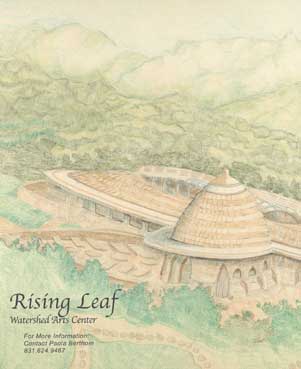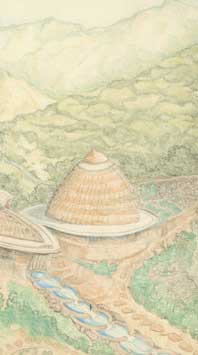

| Watershed Arts Center | |
| Support from Elected Officials | |
| RisingLeaf Watershed Arts Education | |
| Accomplishments | |
| Resources | |
| Directors | |
| Contact | |
Watershed Arts Center
The RisingLeaf Watershed Arts Center will reflect a living, indigenous understanding of the natural world and a site-specific application of the following ecological organizing principles articulated by Sim Van der Ryn:
These principles are...
1. The best solutions are arrived at by paying attention to the unique qualities of a given place.
2. Direct and indirect environmental costs of design decisions are traced using ecological accounting.
3. Work with nature's processes of regeneration, thus transforming maker and user.
4. Everyone is a designer; each voice in the design process needs to be honored.
5. Make nature’s cycles and processes visible in the design of the constructed place.
The center will demonstrate natural systems by employing permaculture design, native plant restoration, innovative water catchment and treatment systems, and alternative energy. To encourage transportation alternatives, use of bicycles and the Monterey-Salinas Transit system will be promoted along with providing a shuttle system as needed. Parking for cars will be off-site.
As water is the essence of all life, watershed education will provide the focus for all of the center's outreach. Programs and workshops will feature local and visiting nature writers and artists, place-based educators, bioregional thinkers, theatrical performers, and musicians. Additional events will be organized on topics ranging from restoration of habitats in the Carmel River Watershed, to whole-systems design, and biodynamic agriculture.
The Rising Leaf Watershed Arts Center will house an arts and ecology library, bookstore, and gallery which will highlight various projects. Native plants will be for sale to encourage their use in gardening and landscape restoration. A demonstration, energy-efficient kitchen will be designed for teaching about and celebrating the food grown at the center.
The Carmel River Valley, with its unique and diverse habitats, is an historical landscape that is fast disappearing. This valley deserves a watershed arts center, for through its dynamic presence, local citizens and visitors can strive to be better stewards of these threatened lands upstream from the Monterey Bay National Marine Sanctuary. Through relationship-building, education, and action, the center can bring to bear the native intelligence, scientific understanding, and commitment required to solve the interrelated social, and environmental problems facing our culture.
"As
the Assemblymember for the 27th District, I fully
support the goals
of RisingLeaf Watershed Arts and their proposal to establish a Watershed Arts Center in Carmel Valley. Water, of course, is one of the most important resources we have. Creative approaches such as those undertaken by RisingLeaf Watershed Arts will be necessary component as we address our water needs." -- Assemblyman John Laird, 2004 |
RisingLeaf
Watershed Arts is a 501(c)(3) public benefit
organization. All
site content© RisingLeaf |

